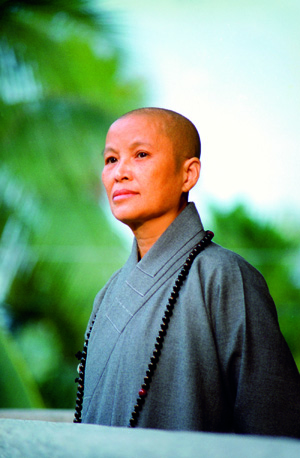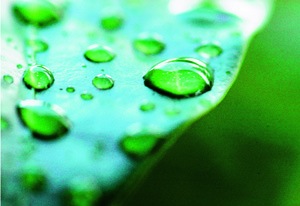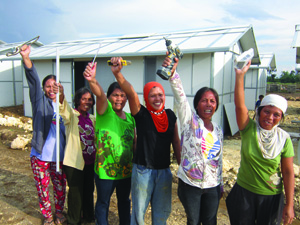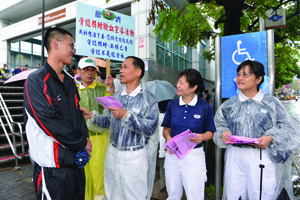

| The Most Beautiful Is Great Love | |||||||||
| By Dharma Master Cheng Yen. Translated by Teresa Chang | |||||||||
In early April this year, Somali militants burst into a university in Kenya and killed nearly 150 people. Their justification for this horrific act was to get revenge on Kenya for sending troops into the civil war in Somalia. Ten days after the tragedy, a power transformer explosion at another university sent students panicking in fear of another attack. One person died in the ensuing stampede, and over a hundred students were injured. It is sad, heartbreaking, to see disasters happening in this world as a result of hatred. These man-made disasters, coupled with frequent natural disasters induced by erratic climate conditions, are causing much suffering in the world. We should never underestimate the power of a seemingly insignificant bad thought or let our unchecked minds blurt out bad words. Bad deeds, however small, accumulate over time and can trigger disasters. Once hatred is stirred up, it is difficult to stop it. Likewise, we must not pass up any chances to do good deeds just because they seem trivial. The accumulation of small kind deeds can bring about a peaceful world. When you harbor kindness in your mind, you will find every moment a good moment and every day a good day.
Drought of the mind Western Taiwan is facing a serious drought. Third-phase water rationing is being enforced in some areas. California, in the United States, is in the fourth year of a record-breaking drought. Snowpack used to be a major source of water for California, but not much snow fell last year. Like Taiwan, the area is now facing water rationing. In a drought, everything loses vitality. Even seeds planted in the soil will not sprout. Similarly, if our minds are “arid” and lack spiritual nourishment, the dust of affliction will easily rise and searing mental fires can rage. The Dharma, the Buddha’s teachings, is like water. When we frequently expose ourselves to the Dharma, our minds will be well-nourished and our wisdom will grow. There is a Buddhist story: The Buddha traveled to Magadha to spread the Dharma. Among the disciples who went with him was Uruvela Kassapa, who had been a renowned fire-worshipper before he took refuge in the Buddha. When people saw that both the Buddha and Uruvela Kassapa were present together, they were not sure which one was the teacher. The Buddha could see the people’s uncertainty, so he asked Uruvela Kassapa to speak to the crowd. Uruvela Kassapa then talked about his past ascetic practice—how, under the blazing sun, he would stay close to a burning fire as a form of spiritual cultivation. Such a severe practice, however, did not free his mind of desires and afflictions. Though his body endured the great heat, his mind did not find peace. After he was exposed to the Buddha’s teachings, things changed. Receiving the Dharma gave him a soothing coolness he had never experienced before. Knowing that he had found the path to liberation in the Dharma, he abandoned fire-worshipping and became a follower of the Enlightened One. What Uruvela Kassapa said dissolved the crowd’s hesitation. They took the Buddha as their teacher.
Try standing on hot sand under the scorching sun—you will feel extremely uncomfortable. But if at such times some clouds obscure the sun and a breeze rises, you will immediately cool off and feel soothed. The same happens when rain falls on land that has endured a long drought. Nature needs the relief and nourishment of water. The rain falls on everything equally. Be it big trees or small blades of grass, all things receive the soothing moisture. The destructive heat is dissipated and everything absorbs the life-giving water. Our minds, like nature, need such nourishment too. When bad things happen to us, we might fly into a rage. If we allow such fires of rage to spread, we might bring disasters to our families, society, or even the whole of humanity. We must constantly absorb the Dharma to put out the fires of affliction in our minds. As long as the direction in which we are going is correct and we don’t go astray, we will be able to endure all hardships with peace of mind, no matter how rugged our path is.
Light up the darkness Typhoon Haiyan devastated the central Philippines in November 2013. Jerry and Jane Canonigo, a married couple who lived in Tacloban, lost their home in the disaster. All they had left was 5,000 pesos. Life became difficult for this family of five. When Tzu Chi launched a cash-for-work program to help clean up devastated communities, the couple joined in. At the end of a workday, they each received 500 pesos from the foundation. Later, when Tzu Chi distributed cash aid to typhoon victims, the couple received 15,000 pesos. With these funds, the Canonigos started a lumber business. The couple worked hard and rested little. Their hard work paid off and their lives finally got back on track. As their lumber business got better and better, they didn’t forget the help they had received from Tzu Chi. They wanted to repay such kindness by giving back to society, so they sold their lumber at reduced prices to help typhoon survivors rebuild their homes. They even began saving their spare change in a coin bank to help the needy. Though Haiyan brought large-scale devastation, it also awakened the goodness in people’s hearts. Many survivors who received aid from Tzu Chi later signed up to be volunteers. They realized that even small amounts of money when put together can do a lot of good, so they began saving up their petty cash to do charitable work. They also took up recycling, one of the causes of the foundation, to help protect the Earth. Such goodness has helped the devastated land to heal. Tzu Chi is building prefabricated houses for survivors in Ormoc, another of the areas hard-hit by Typhoon Haiyan. Over a hundred families have already moved in. The mother of one family said that she fell asleep with tears in her eyes the first night after she moved in. As she lay on the folding bed that they received from Tzu Chi and looked around at the roof and four walls, she thought about how she and her family finally had a home again, and how they would be able to sleep soundly, even during rainy nights. At these thoughts, she just couldn’t hold back her tears. Why did Tzu Chi volunteers reach out to the typhoon victims, people who were complete strangers to them, to help their lives regain stability? It’s all due to love, due to an inability to stand by while people suffer. This loving compassion brought Tzu Chi into existence 50 years ago, and it has also taken our volunteers from Taiwan to many countries around the world to relieve suffering. This inability to see people suffer is a love that transcends nationality, religion and ethnicity. As our volunteers give joyfully, people receive our help gratefully. What could be a more beautiful picture than this? A single lamp can lighten up a room that has been shrouded in darkness for a thousand years, just as the Buddha’s teachings can bring light to people’s minds and drive out the darkness of their mental afflictions. When our hearts are filled with light, that inner light will shine forth and expel the darkness around us. I hope that our world has an inexhaustible supply of love and an endless reserve of the inner light of wisdom so that happiness can be brought to everyone.
Tzu Chi bone marrow registry In 1993, Taiwan’s Health Department and medical community entrusted to Tzu Chi the establishment of a bone marrow registry that would promote bone marrow donation to unrelated recipients. Some medical professionals at that time tried to dissuade me from embarking on this huge undertaking. They said, “Master, don’t do it by any means. The pressure will be too much for you to bear.” Data from at least 10,000 potential donors was required to establish a meaningful marrow donor registry. Taiwan did not have an immunogenetic laboratory at the time, so all the blood specimens collected from potential donors would have to be sent to the United States to be processed. The cost needed would be huge. Moreover, where would we find all those potential donors? [Back then, there were some common misconceptions about marrow donation in Taiwan which would make it harder to promote the cause.] Even if we did find a match, there was always the possibility that the potential donor might back out of his or her commitment to donate. Difficulties and challenges truly abounded in such an undertaking. Despite the difficulties, I knew that marrow transplantation was often the last hope for blood disease patients and that Taiwan had the needed technical skills to perform such operations. All we needed were people willing to be donors. Life is priceless. I really could not bear to see people die when the possibility of saving them was still there. When we know something needs to be done, we should just go all out to do it. Therefore, after I ascertained that a marrow donation would not harm the donor, I decided to go for it. In mid-October that year, I started out on my regular trip to Tzu Chi branches around Taiwan. When I reached our Taidong branch, I told our volunteers of my intention to set up a bone marrow registry. People in Taidong, which is a relatively rural area, were generally more conservative, and our volunteers there were more advanced in age. Despite all that, they gave me their full support without any hesitation. They said that although they did not know what a bone marrow donation was, they believed that I would never harm a healthy person to save a sick person. They had implicit faith in me. “No matter what you want to do, we’ll be behind you,” they said. I saw love and courage in these simple, pure-hearted volunteers. Later, when my trip took me to Pingdong, Kaohsiung and Taichung, the volunteers in those cities gave me the same support. “When it comes to doing the right thing, just do it,” they said. That was truly a shot in my arm. One day, after I had finished giving a talk at the Taichung office and was walking out, I met a young volunteer. Another volunteer who was present said to him, “The Master is establishing a bone marrow registry—a strong, young man like you would make a perfect candidate.” The young man promptly replied, “I’m willing to be a donor if I qualify.” No time can be wasted when it comes to saving lives. It just so happened that Tzu Chi, the Council of Labor Affairs, and the Government Information Office were holding a mountain clean-up event and charity bazaar in Zhanghua, central Taiwan, on October 24. A booth was quickly added to the bazaar to promote bone marrow donation. On that day alone, more than 800 people signed up to be donors and had their blood samples drawn. Tzu Chi volunteers supported the cause by signing up to be donors themselves and by thinking up different ways to encourage people to sign up. Some wore signboards that read: “Be a bone marrow donor. You can save a life without affecting your health.” There was even an elderly volunteer who would cry out, “Help! Help!” to attract people’s attention. Once she had their attention, she took them to our bone marrow drive site and asked other volunteers to explain the cause to those people. To act in the spirit of religion is to love others as we would love ourselves. When others hurt, we feel their pain; when others suffer, we feel their sorrow. We live out Great Love when we give to others without discrimination, without selfish intentions. In establishing a marrow registry, I believed that my intentions were selfless and that innate love resided in everyone. Therefore, even though I knew that challenges abounded, I went for it. I hoped to help save lives and to bring out the love in people. Thankfully, with Tzu Chi volunteers’ full support, we have been able to sail through the many difficulties. Over the past two decades, Tzu Chi has put tens of millions of Taiwanese dollars into the bone marrow donation program. The effort and energy our volunteers have devoted to it are immeasurable. Since the establishment of the Tzu Chi Bone Marrow Registry [renamed the Buddhist Tzu Chi Stem Cell Center in April 2002], over 3,800 donations have been completed. Blood cancer patients in 29 countries have benefited. I am full of gratitude to all donors for giving unconditionally, for helping save lives with love and courage. When they were told they were a match, they did not back out; instead, they worked on getting healthier in order to provide higher quality bone marrow for their matches. Many donors have told me the same thing: “It feels wonderful to save a life.” Since Tzu Chi was founded half a century ago, all of our missions have been launched for a simple and pure reason—we cannot bear to see others suffer. Though the path we have traveled has not been an easy one, we go about our work with a heart of joy. In walking the Bodhisattva Path, we must make the Four Great Vows and strive to fulfill them: “I vow to save all living beings however countless they are, to get rid of all worries however innumerable they are, to study the methods of the Dharma however endless they are, and to attain the Buddha Way however transcendent it is.” We must also live out the spirit of the Four Immeasurables: loving-kindness, compassion, joy, and equanimity. I thank all Tzu Chi volunteers for working together to relieve suffering. They do so without complaint and without expecting anything in return, and they employ the best methods they can think of to do their work. All they hope is to bring peace to people’s minds. I’m truly grateful to see them give so willingly and with such unwavering resolution and unconditional love. My gratitude to them will last lifetime after lifetime.
● Sukantonga, 75, lives in Medan, Indonesia. He used to teach Chinese. Six years ago, when his wife suddenly passed away, he kept her body in the house. When a bad smell arose, his neighbors asked him where his wife was. “She’s sleeping,” he replied. He really thought so. Later, his relatives came to help him arrange the funeral. After all was taken care of, Sukantonga, unable to accept the loss of his wife, began closing himself off. He remained shut off for six years. Tzu Chi volunteers learned of Sukantonga’s situation and went to visit him, but he refused to open the door. Our volunteers did not give up though. They visited him whenever they got the time and tried to talk to him from outside his home. Three months later, Sukantonga finally let down his guard and let the volunteers into his house. As soon as they entered the house, the volunteers saw large amounts of garbage inside. Their hearts went out to Sukantonga for living in such appalling conditions. After obtaining his permission, a group of volunteers began visiting his house to clean up. It took them three whole months to finish the work. They also taught Sukantonga’s mentally challenged foster son how to do laundry, clean up the house, and do other chores. Recently Sukantonga wrote me a letter in which he said he was very thankful for and touched by our volunteers’ help. He also said that because of the care he had received from Tzu Chi, he was more at peace. He said he had walked out of darkness and seen light ahead of him. This story shows love in action. Without love, how could our volunteers have worked so patiently to help lift Sukantonga out of his misery? Embracing Great Love with a religious spirit, our volunteers willingly contribute what they can to make a difference in others’ lives. I founded Tzu Chi when I was 29 years old. In what seems to be a blink of an eye, I am now close to 80 years old. I have completely dedicated my life throughout all these years to the well-being of humankind. I hope to bring out the most genuine and purest love from people and pool together that love to help the powerless, the needy, and those affected by disasters. I hope we not only relieve people’s suffering, but accompany them and cheer them up until their minds are uplifted and they are no longer enslaved by mental afflictions. Everyone experiences mishaps in life. When people are in need and we reach out to them and help them sincerely, we can help free them from suffering. Let us all strive to make a positive difference in others’ lives.
This article is excerpted from a series of speeches delivered by Master Cheng Yen from April 1 to 20, 2015. |

















|




